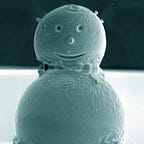AraCon 2019: Aragon wants to decentralize the planet
In May 2017 I described the Aragon network as “a Decentralized Autonomous Organization (DAO) that wants to act as a container and a digital jurisdiction for other decentralized organizations.” Later in May 2017, the first Aragon Network Token (ANT) crowdsale raised $25 million in 15 minutes.
See the two posts linked above for my enthusiastic comments on Aragon in 2017. Today, after seeing steady progress from the Aragon team and community, I’m even more enthusiastic.
The Aragon white paper describes the Aragon network as:
“An opt-in jurisdiction that facilitates more efficient interactions between blockchain-native digital entities using economic incentives. Users are required to stake digital assets in order to participate in governance and to collateralize subjective agreements. In the event of a dispute a decentralized court serves as an oracle to resolve and enforce agreements between participants. An algorithmic monetary policy manages reserves and issuance of ANT to incentivize participation and healthy growth of the network.”
The Aragon Project is stewarded by the Aragon Association, a Swiss non-profit entity. Today “it’s possible for anyone in the world to spin-up a decentralized organization thanks to aragonOS (a marvel of smart contract engineering) and the Aragon client app,” said Stefano Bernardi in November 2018, upon his joining the Aragon Association as its first Executive Director.
“I think that Aragon is one of the most important projects that have come out of the decentralized computing movement in the past few years, with a clear potential to radically transform how people interact, collaborate and transact in the real-world.”
The Aragon Conference AraCon, starting today in Berlin (watch the livestream), brings together “those who are building and supporting the pseudonymous, secure, trustless future — the decentralized web.” Aragon emphasizes that decentralized governance and DAOs are at the heart of the new Web 3.0, and keys to a more fair and open world for everyone.
I am not anti-centralization, or anti-government. On the contrary, I understand that centralized systems and governments have, and will continue to have, an important role to play. But I consider centralization as a (sometime) necessary evil, and I look forward to seeing DAOs taking charge of important works, locally and globally.
The concept is simple — in theory. The internet has given most people in the developed world the possibility to interact online with like-minded people, and is slowly but steadily expanding to the rest of the world. Cryptocurrencies independent of governments can be transferred over the internet, with pretty good privacy if the appropriate measures are taken. Smart contracts permit automatically processing payments and governance actions if pre-stated conditions are met. It seems to follow that all the building blocks for DAOs are in place.
Not so fast — the devil is in the details. The internet, cryptocurrencies, and smart contracts are the basic DAO building blocks, but additional infrastructure is needed to make DAOs scalable to very large communities, efficient, and — last but most certainly not least — easy to use. Aragon is building this much needed second infrastructure layer for unstoppable, global, bureaucracy-free organizations, companies, and communities.
Aragon is announcing that nine projects to advance Aragon’s vision have been approved by ANT holders for funding.
The Autark project, which has been funded with 390,000 DAI (which is $390,000, since DAI is a stablecoin pegged to the USD), is especially dear to my heart. Project co-leader Yalda Mousavinia is giving a talk at AraCon today. In a followup post I’ll zoom on Autark and Yalda’s plans to take decentralization beyond Earth.
Picture from Jan Fidler/Flickr.
